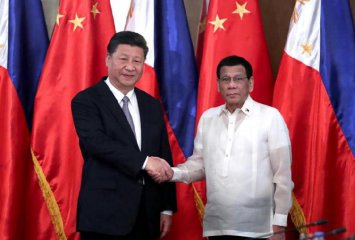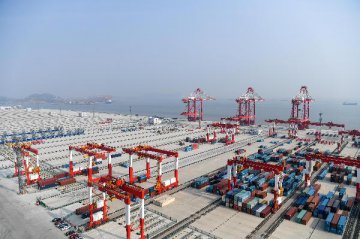The Philippines' economy is projected to stay resilient in 2019 amidst short-term challenges, regional think tank ASEAN+3 Macroeconomic Research Office (AMRO) said in a report on Monday, noting the growth will be supported by robust domestic demand.
The Philippines economic growth slowed to 6.2 percent in 2018, due to weaker external demand and private consumption.
The economy is projected to recover to grow by 6.4 percent in 2019, according to the 2018 Annual Consultation Report on the Philippines.
"Going forward, the economic growth momentum will gradually recover, driven largely by domestic demand. Private consumption is projected to recover in the second half of 2019, as inflationary pressures eased and consumer confidence is restored," the report said.
At the same time, it said the Philippine government is expected to continue to provide firm support to the economy through expedited infrastructure projects and continued strong spending on consumption, particularly in an election year.
However, the report warned that the tightening of financial conditions may hold back and limit the upside potential of investment.
Exports will remain tepid, said the report. Headline inflation is expected to continue its downward trend started in late 2018 into the 2 to 4 percent target range in 2019, on the back of lower oil prices and continuing rollout of government's measures to dampen inflationary pressures, such as the passage of rice tariffication bill.
Due to the high demand for imports of capital goods and raw materials for infrastructure investment projects, the report predicted the current account will remain in deficit this year.
The major risks facing the Philippine economy are mostly short-term, the report said, noting that "externally, escalating global trade tensions and a sharp tightening of global financial conditions remain the major risks."
The report said the ongoing efforts of Bangko Sentral ng Pilipinas (BSP), the country's central bank to strengthen macro-financial surveillance and develop various macro-prudential toolkits should continue.
Moreover, it said the government should strengthen the reform agenda to continue enhancing the growth potential, adding "besides physical infrastructure, social infrastructure also needs to be enhanced."
The Philippines economic growth slowed to 6.2 percent in 2018, due to weaker external demand and private consumption.
The economy is projected to recover to grow by 6.4 percent in 2019, according to the 2018 Annual Consultation Report on the Philippines.
"Going forward, the economic growth momentum will gradually recover, driven largely by domestic demand. Private consumption is projected to recover in the second half of 2019, as inflationary pressures eased and consumer confidence is restored," the report said.
At the same time, it said the Philippine government is expected to continue to provide firm support to the economy through expedited infrastructure projects and continued strong spending on consumption, particularly in an election year.
However, the report warned that the tightening of financial conditions may hold back and limit the upside potential of investment.
Exports will remain tepid, said the report. Headline inflation is expected to continue its downward trend started in late 2018 into the 2 to 4 percent target range in 2019, on the back of lower oil prices and continuing rollout of government's measures to dampen inflationary pressures, such as the passage of rice tariffication bill.
Due to the high demand for imports of capital goods and raw materials for infrastructure investment projects, the report predicted the current account will remain in deficit this year.
The major risks facing the Philippine economy are mostly short-term, the report said, noting that "externally, escalating global trade tensions and a sharp tightening of global financial conditions remain the major risks."
The report said the ongoing efforts of Bangko Sentral ng Pilipinas (BSP), the country's central bank to strengthen macro-financial surveillance and develop various macro-prudential toolkits should continue.
Moreover, it said the government should strengthen the reform agenda to continue enhancing the growth potential, adding "besides physical infrastructure, social infrastructure also needs to be enhanced."





















Latest comments